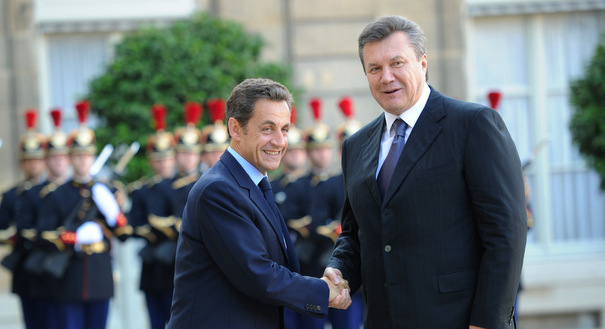As most of Europe waits with bated breath for the outcome of the French presidential election, Ukrainians are entirely ignoring it. The race receives little media coverage, there is no debate about possible results, and no one is attempting to figure out how to build better relations with France after the elections. Instead, Ukrainians are busy preparing for their parliamentary elections scheduled for October 28.
Not that such a lack of attention is surprising. When it comes to the European Union, Germany and Poland are the two countries that really matter in the eyes of Ukrainians. Germany, according to the official line in Kyiv, does not want Ukraine in the EU and thus blocks all possible integration steps. It refused, for instance, to the sign the EU’s recently initialed Association Agreement with Ukraine. Historically Ukraine’s the biggest supporter, Poland, is used to keeping Ukraine on the EU radar screens.
As for France, seen from Kyiv, Paris is naturally allied with Moscow. France is perceived as not interested in EU enlargement and therefore not interested in Ukraine. So why bother about the French elections?Yet, Kyiv should probably care. France, one of the largest EU member states, has a lot to say when it comes to the EU’s foreign policy. Relations with the EU’s neighborhood, including Ukraine, are of particular interest to Paris. Moreover, it is the president of France, not the foreign minister, who drives foreign policy today.
While the Socialist candidate François Hollande remains completely unknown to politicians in Ukraine, Kyiv has seen President Nicolas Sarkozy in action. Responding to French public opinion, Sarkozy rejected any idea of perspective EU membership for Ukraine. Instead, he came up with the formula for Ukraine’s “association” with the union at the 2008 EU-Ukraine summit. While Ukrainians felt that their European aspirations were confirmed in some ways, in reality, the association path meant that membership talks were off the table.
But it would be wrong to blame France or its president for closing the door to Ukraine. EU foreign policy decisions are made with the consent of its 27 members. If Ukraine had been performing well, France would have been in the minority. But it wasn’t. Despite the exceptional aftermath of the Orange Revolution, Ukraine showed little interest in truly following the European way. The Orange team engaged in political infighting, leaving the country completely unreformed. France watched rather patiently.
The current Ukrainian leadership has swept the country away from the EU (or, more positively said, it has taken the longest and rockiest possible road toward the union) by prosecuting the opposition, dismantling the country’s fragile democracy, and worsening the business climate. France could not stay neutral. Negative statements from Paris and diplomatic demarches from the French ambassador in Kyiv followed.
It should be obvious that statements from French leaders matter for Ukraine. And Ukrainians still have time to catch up with the French presidential elections. So far foreign policy has not played a significant role in the campaign. Even France’s long-term partner Russia has not made it into the presidential debates. However, this may well change after the first round of elections.
One thing is already clear: Ukraine’s interests, such as further EU enlargement and visa-free travel to the Schengen zone for third-country nationals, will be difficult subjects for Paris to digest. Whoever wins the election will not be very supportive of further enlargement, as he or she will have to conform to the generally negative French public sentiment on the matter. While President Sarkozy’s recent statements on France’s possible withdrawal from the Schengen Agreement may just be an attempt to win votes, in Paris, there will be very few arguments in favor of opening the EU’s borders for undemocratic and unreformed regimes in Europe after the elections.
According to opinion polls, Sarkozy and Hollande are likely to meet in the second round. If elected, Sarkozy is likely to continue his cautious policy toward the EU’s eastern neighborhood. France observers suggest that Hollande, who has little experience in foreign policy, may be less vocal on this. Still, either man will most likely be intolerant to undemocratic developments in the east.
Under any president, France is ready to step in with more investment and trade; it is up to Ukraine to take advantage of such support. If Ukraine wants to win France’s backing in the EU, at least for the signing and ratification of the Association Agreement, it will have to be “holier than the Pope.” It will have to reform economically and make significant steps toward democracy. If ordinary Ukrainians want to travel freely to the EU, Kyiv will have to prove that it is genuinely making progress on reforming its judiciary and rule of law, especially to countries like France. In the end, it is less about what the French do when they go to the polls, and more about what Ukraine can do on its own.
Long ago, a marriage between two heirs—Anna, the daughter of Grand Duke Yaroslav of Kyiv Rus, and King Henry I of France—could help improve relations between the two countries. Nowadays, there is no such magic bullet. If Kyiv wants better relations with France under any president, it will have to get to work.





